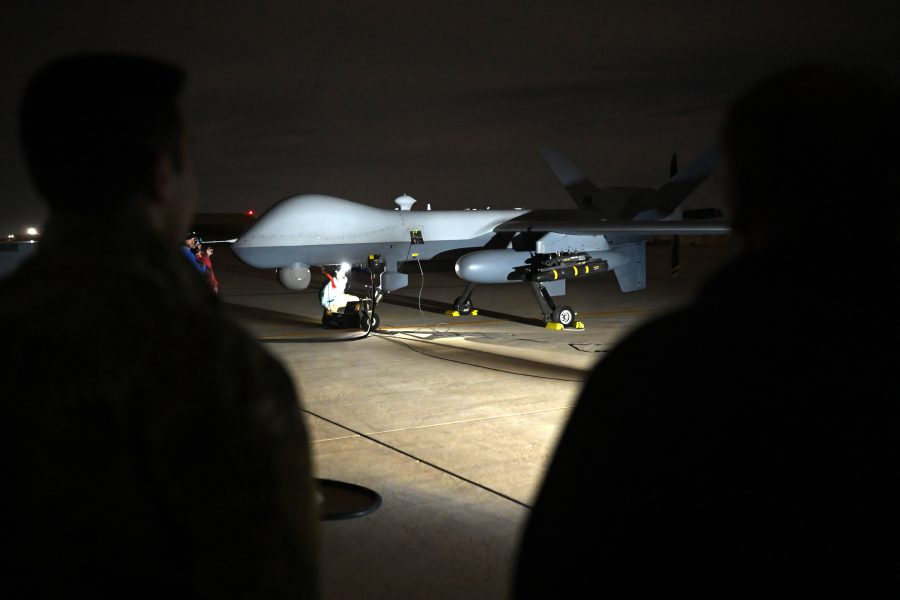The U.S. launched a preemptive airstrike in Musayib, Iraq, on July 30, against individuals who were preparing to launch one-way attack drones against U.S. forces, U.S. defense officials told Air & Space Forces Magazine.
The “defensive airstrike” came a week after rockets were launched at U.S. troops in Iraq and Syria, the officials said.
Secretary of Defense Lloyd J. Austin III, departing the Philippines after bilateral meetings there, referenced the attack July 31: “The safety and protection of our troops is really, really important to me,” Austin said. “That’s why you saw us take some measures to protect ourselves here most recently as we took out some UAVs which were about to be launched. We have the right to do that and we will continue to do that in order to protect our troops.”
The target was a facility south of Baghdad used by the Iranian-aligned Kataib Hezbollah group, which is part of Iraq’s Popular Mobilization Forces (PMF). The Iraqi government expressed outrage at the strike on the PMF site and said it violated Iraq’s sovereignty.
Meanwhile, apparent Israeli attacks on a pair of leaders of U.S.-designated terrorist organizations increased tensions in the region. On July 30, Israel attacked and killed a top Hezbollah military leader in Lebanon. The political leader of Hamas was killed during a trip to Iran a day later in an operation almost certainly carried out by Israel.
Killed were:
- Fuad Shukr, one of Hezbollah’s top military commanders, in retaliation for a July 27 attack by Hezbollah in the Golan Heights that killed 12 civilians, mostly children; and
- Hamas’ political leader, Ismail Haniyeh, who was in Tehran for the inauguration of new Iranian president Masoud Pezeshkia, and had been involved in ceasefire negotiations with the U.S. seeking an end to the war in Gaza.
Israel has not acknowledged killing Haniyeh, and Austin deflected questions on the incident when asked about it by reporters.
The twin attacks inflame tensions and could lead to further U.S. involvement, either against other potential attacks on U.S. forces or if the U.S. needs to help defend Israel against a long-range attack from Iran.
“I don’t think war is inevitable,” Austin said. “I think there’s always room and opportunities for diplomacy. And I’d like to see parties pursue those opportunities.”
U.S. forces have been facing rocket attacks on al-Asad Air Base in Iraq and Mission Support Site Euphrates in Syria in the past week. Iran, which supports both Hezbollah and Hamas, is unlikely to let an attack on its own soil go without response. While its long-range attack on Israel was foiled in April, it is likely to seek some way to retaliate, either directly or indirectly, through one of its proxies, which could include Iranian-aligned militias, Lebanese Hezbollah, and the Houthis in Yemen. Iran’s supreme leader Ayatollah Ali Khamenei said it was Iran’s “duty” to avenge Haniyeh’s death.
Attacks on U.S. forces in the region had decreased following U.S. airstrikes in February against Iran’s Islamic Revolutionary Guard Corps (IRGC) and Iranian-aligned militias, which took out 85 targets in Iraq and Syria in a massive bombardment. The U.S. airstrike demonstrated America still has the will to strike inside of Iraq.
“It’s quite impressive. It’s a robust response,” Michael Knights of the Washington Institute for Near East Policy told Air & Space Forces Magazine. “We’re demonstrating that we know the exact buildings that these drones are coming from and we reserve the right to strike them.”
U.S. troops have been attacked over 180 times in Iraq, Syria, and Jordan since October. Three Soldiers were killed at Tower 22 in Jordan, which supports the U.S. outpost of Al Tanf Garrison just across the border in Syria, in January.
“I think it’s all connected, but I think, quite frankly, I don’t see a return to where we were several months ago—not yet,” Austin said.
The U.S. has 2,500 U.S. troops in Iraq and 900 in Syria. Iraqi and U.S. officials discussed how to end the official military campaign against the Islamic State and transition to a different security relationship during meetings in Washington last week.
The Pentagon said Austin spoke with Israeli Minister of Defense Yoav Gallant July 31 and discussed the attack by Hezbollah and threats to Israel posed by a range of Iranian-backed terrorist groups, according to Deputy Pentagon Press Secretary Sabrina Singh, who provided a readout of the call.
Speaking in the Philippines, Austin said the U.S. was prepared to respond if Iran attacked Israel. U.S. Air Force F-15s and F-16s, as well as other U.S. forces, helped Israel defeat hundreds of drones and missiles launched by Iran earlier in the year.
“If Israel gets attacked, we certainly will help,” Austin said. “You saw us do that April. You can expect to see us do that again. … But we’re going to work hard to make sure that we’re doing things to help take the temperature down.”


